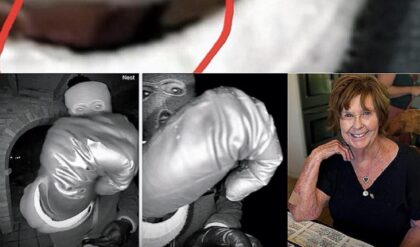
A Sweet Baby Inc. employee named Camerin Wild, who claims to be non-binary, admitted that his goal is “burning the games industry to the ground.”

Suicide Squad: Kill the Justice League Sweet Baby Inc. credits
In a presentation titled “How to Get Away With Murder Subverting Genre Expectations” at The Game Developers of Color Expo discovered by YouTuber Kirsche, Wild introduces himself saying he is a “narrative designer and sensitivity reader with a company called Sweet Baby Inc.”
Wild, who according to Moby Games worked on Tales of Kenzera: Zau, Suicide Squad: Kill the Justice League, Alan Wake II, The Crew: Motorfest, Kingdom EIghties, and God of War: Ragnarök, then declared “the stories we tell each other are way more than entertainment. They are how we create debate and preserve our collective values and beliefs. And we can and should make better more expansive, more representational content.”
Then in a slide titled, “Cool, so why am I here?” One of the bullet points states, “Burning the games industry to the ground.”

Camerin Wild via Game Devs of Color Expo YouTube
In the next slide titled “So why am I still here?” One of the bullet points states, “To prove that space where whiteness doesn’t have to live-is where some of the best stories are told.”
Wild explained, “A lot of us who are really fighting for more inclusive games and storytelling don’t have a choice when it comes to discomfort. A lot of us who are just existing don’t have a choice. Which makes this really hard often. But recently I started realizing that discomfort or the place where whiteness doesn’t have to live is where some of the best stories are told. And it’s where genre storytelling lives.”

Camerin Wild via Game Devs of Color Expo YouTube
Later in the presentation, Wild explains why Blazing Saddles is his favorite film. “The reason why I love it beyond some truly Mel Brooksian slapstick humor and fart jokes Blazing Saddles is extremely aware of social inequality and finds its humor in that darkness, which means I can laugh in a way that is cathartic. It’s a movie that isn’t making jokes about me, but for me. And I think that’s really awesome.”
“Because you can just tell in the text, but it’s also a fact that Brooks worked with black writers to make sure the jokes came at the expense of whiteness and chipped away in an absurd social hierarchy. It’s deliberately and unexpectedly a narrative that contributes to the liberation of people like me. It isn’t respectful. It’s offensive. But, yeah, it offends the right people, which is to me the point of truly incisive, intentional genre work.”

Carol Arthur as Harriet Johnson, Harvey Corman as Hedley Lamarr, and Cleavon Little as Bart in Blazing Saddles (1974), Warner Bros. Pictures
In one ironic moment during the presentation, Wild did share a nugget of truth, “Ultimately, if you’re telling a story that misses its audience, that doesn’t ring true, or fails to cut in the right direction the problem isn’t that it’s just insensitive. The problem is it’s bad.”
However, he then points to Django Unchained being an example of this. While explaining his point of view, Wild stated, “So a context free version of art is supposed to make people uncomfortable. As an autuer Quentin Tarantino feels like someone who grasps after edginess when they don’t really have any human tragedy to explore the depths of. They don’t understand that growth comes from trauma, sure, but it also comes from joy.”
“He holds a no pain no gain mentality that I think is unshakably rooted in white supremacist patriarchal values,” Wild asserted.

Camerin Wild via Game Devs of Color Expo YouTube
The presentation then turns into a takedown of Tarantino with Wild stating, “I do think [Tarantino’s] work does need to be critiqued out of existence. And that he specifically has to be addressed in any discussion of that work. Because Tarantino is capable of genre filmmaking, but the genre he’s chosen with Django is Blaxploitation.
“And why? I have my own pet theories,” Wild continued. “Personally, I think it’s the same thing we see with any non-black creator who thinks that black people are cool, but can’t really examine the covetous nature of their feelings or their own role in black stories. People who in life met a black person that they wanted to follow, f**k, or befriend, and never resolved it. The equivalent of a little boy pulling a little girl’s pigtails, but it’s a white filmmaker in black paint.”
After about 10 minutes of reviewing Django Unchained and comparing it to Blazing Saddles, Wild declared, “Arguably, [Django Unchained] should never have existed because the truth is some stories are not yours to tell. Unless you’re willing to step out of the limelight as a white person you aren’t equipped to tell a story about a black experience. However, if you are willing to put your own ego aside well you can go ahead and make Blazing Saddles, something great.”

Christoph Waltz as Dr. King Schultz and Jamie Foxx as Django
He then wrapped up the entire presentation by sharing that “good genre starts with representation on the creative team. The foundations of the project must be solid.”
Wild also claims that “the identity of your characters — specifically your heroes — must define their challenges in the narrative, but it must also define their triumphs.”
Finally, WIld claims that “good genre must consider its relationship to power.”

Camerin Wild via Game Devs of Color Expo YouTube
What do you make of Wild admitting one of his goals is “burning the games industry to the ground?”

